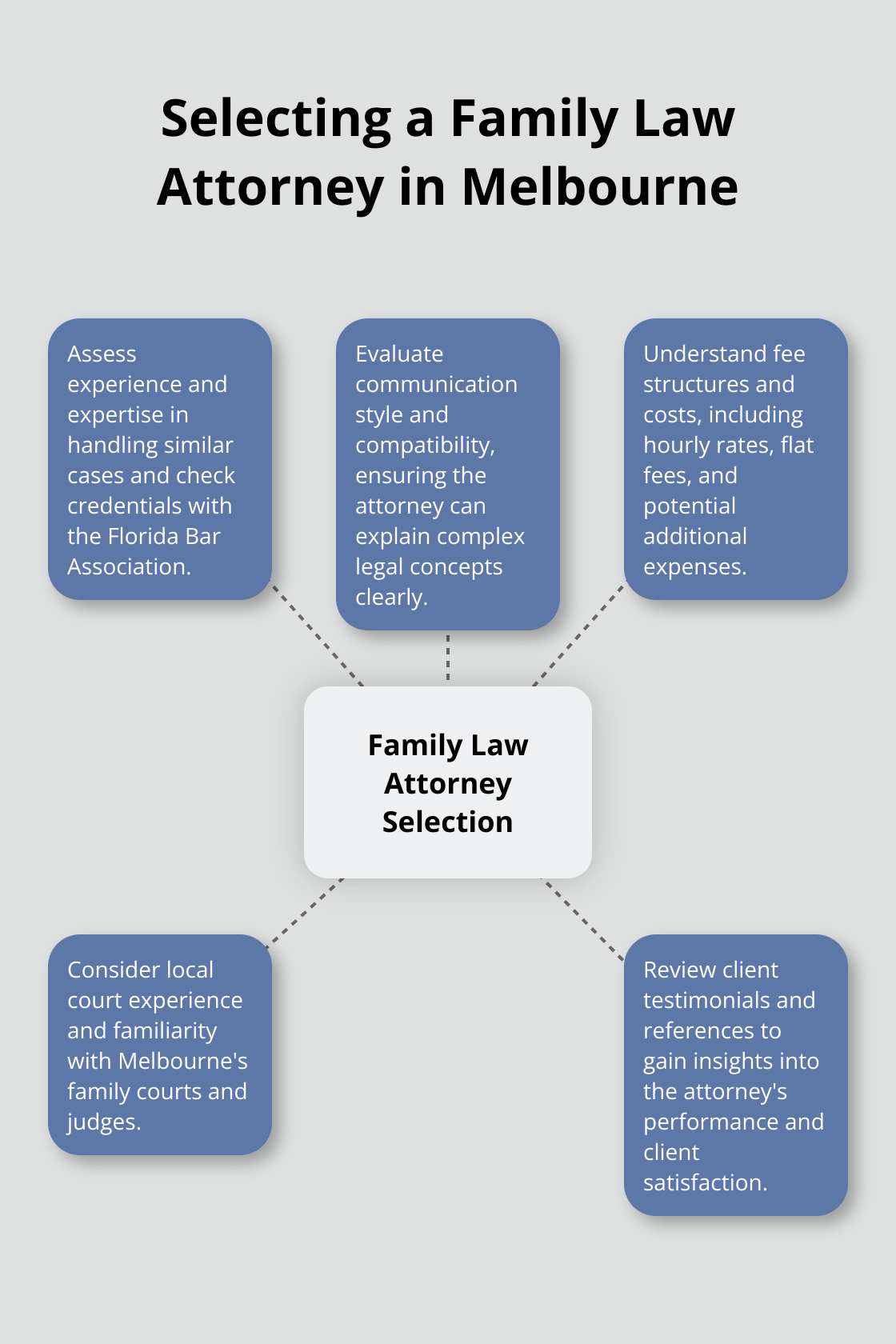Family Law Attorney in Melbourne Florida [2025 Guide]
Our Blog
Family Law Attorney in Melbourne Florida [2025 Guide]
![Family Law Attorney in Melbourne Florida [2025 Guide]](https://harnagelaw.com/wp-content/uploads/emplibot/Family-Law-Attorney-in-Melbourne-Florida-_2025-Guide__1755202022.jpeg)
Family law cases in Melbourne, Florida, can be complex and emotionally challenging. At Harnage Law PLLC, we understand the intricacies of local family law proceedings and their impact on our clients’ lives.
This guide provides essential information for those seeking a family law attorney in Melbourne, Florida. We’ll cover key aspects of the legal process, tips for choosing the right lawyer, and what to expect in Melbourne courts.
What Does Family Law Cover in Melbourne?
Family law in Melbourne, Florida, encompasses a broad spectrum of legal issues affecting families and domestic relationships. This area of law addresses various cases, from straightforward matters to complex disputes.
Types of Family Law Cases
Divorce stands out as one of the most common family law cases in Melbourne. The Florida Department of Health reported a divorce rate of 3.0 per 1,000 population in 2024. This statistic highlights the need for skilled legal representation in divorce proceedings.

Child custody and support cases also occur frequently. These cases involve determinations of parenting time, decision-making authority, and financial responsibilities for children. Florida courts apply the “best interests of the child” standard when making custody decisions.
Other prevalent family law matters include:
- Alimony disputes
- Property division
- Domestic violence cases
Each of these requires a thorough understanding of Florida law and local court procedures.
Recent Legal Changes
Florida family law has undergone significant changes in recent years. In 2023, the state legislature passed a bill that modified alimony laws. This change eliminated permanent alimony and established new guidelines for determining spousal support duration.
Another important development is the increased focus on alternative dispute resolution methods. Melbourne courts now strongly encourage mediation in family law cases. This shift aims to reduce court backlogs and promote more amicable resolutions.
Navigating Complex Cases
Complex family law cases often involve high-net-worth divorces, business valuations, or international custody disputes. These cases require specialized knowledge and experience. For example, dividing a family business in a divorce (which can be a significant asset) often involves intricate financial analysis and negotiation.
Successful handling of complex family law cases requires thorough preparation, strategic planning, and aggressive advocacy when necessary. Attorneys must combine legal expertise with a deep understanding of financial matters and family dynamics to achieve favorable outcomes for their clients.
The nuances of family law in Melbourne play a critical role in shaping the outcomes of legal issues in this area. As we move forward, let’s explore how to choose the right family law attorney to navigate these complex legal waters.
How to Select a Top Family Law Attorney in Melbourne

Assess Experience and Expertise
When you select a family law attorney, experience in handling cases similar to yours should be your priority. Look for lawyers who have successfully navigated complex divorces, child custody disputes, or high-asset property divisions. For instance, if you face a contentious custody battle, an attorney with a track record of achieving favorable outcomes in such cases will prove invaluable.
Check the Florida Bar Association’s website to verify an attorney’s credentials and disciplinary history. This step ensures you work with a lawyer in good standing with a clean professional record.
Evaluate Communication and Compatibility
Effective communication plays a vital role in family law cases. During initial consultations, observe how well the attorney listens to your concerns and explains legal concepts. A good family lawyer should break down complex legal jargon into understandable terms.
Ask about their preferred communication methods and response times. Some attorneys might offer client portals or regular email updates, while others prefer phone calls. Choose a lawyer whose communication style aligns with your preferences to ensure smooth collaboration throughout your case.
Understand Fee Structures and Costs
Family law cases can drain your finances, so you must clearly understand the fee structure upfront. Ask potential attorneys about their billing methods – whether they charge hourly rates or offer flat fees for certain services.
Request a detailed breakdown of potential costs, including court filing fees, expert witness fees, and any other anticipated expenses. This transparency will help you budget effectively and avoid unexpected financial burdens during your case.
Consider Local Court Experience
An attorney’s familiarity with local courts and judges can significantly impact your case. Lawyers who regularly practice in Melbourne’s family courts (and have established relationships with court staff) often navigate the system more efficiently. This local experience can lead to smoother proceedings and potentially more favorable outcomes.
Review Client Testimonials and References
Client testimonials and references provide valuable insights into an attorney’s performance and client satisfaction. Look for reviews on reputable platforms or ask the attorney for references from past clients (with similar cases to yours). These firsthand accounts can offer a realistic picture of what to expect when working with a particular lawyer.
As you embark on your search for the right family law attorney in Melbourne, keep these factors in mind. The next section will outline the family law process in Melbourne courts, helping you prepare for what lies ahead in your legal journey.
How Does the Family Law Process Work in Melbourne Courts?
The family law process in Melbourne courts follows a structured path, but it can be complex and emotionally challenging. We guide our clients through each step, ensuring they understand the process and prepare for what lies ahead.
Filing the Petition
The process starts when a party files a petition in the Brevard County Circuit Court. This document outlines the relief sought, whether it’s divorce, child custody, or support. In 2024, the filing fee for a divorce petition in Brevard County was $408 (with additional charges for related actions like child custody or support).
After filing, the petitioner must serve the other party with the petition and a summons. The respondent then has 20 days to file an answer. If the respondent fails to respond, the court may issue a default judgment, which could limit the respondent’s rights in the case.
Mandatory Disclosure and Discovery
Florida law requires both parties to exchange financial information within 45 days of service of the petition. This mandatory disclosure includes tax returns, pay stubs, and bank statements. The court may impose sanctions if a party fails to comply.
The discovery phase allows each party to gather additional information. This may involve interrogatories (written questions), requests for production of documents, or depositions. In complex cases, such as those involving high-value assets or businesses, forensic accountants or other experts often assist in this process.
Mediation: A Key Step
In Brevard County, mediation is mandatory for most family law cases before a final hearing can occur. According to the 18th Judicial Circuit Court, in 2024, 67% of family law cases that went through mediation reached a full or partial agreement.

Mediation offers several advantages:
- It’s typically faster and less expensive than going to trial.
- It allows parties to have more control over the outcome.
- It can reduce conflict and foster better post-divorce relationships (especially important when children are involved).
We prepare our clients thoroughly for mediation, ensuring they understand their rights and options. Well-prepared clients often achieve more favorable outcomes in mediation.
Court Hearings and Trial
If mediation doesn’t resolve all issues, the case proceeds to court. This may involve temporary hearings on issues like temporary support or time-sharing arrangements. These hearings can significantly impact the final outcome, making skilled representation essential from the outset.
If a full trial is necessary, it typically occurs 6-12 months after the initial filing, depending on the court’s schedule and case complexity. During trial, each side presents evidence and arguments to the judge. In family law cases, there’s no jury – the judge makes all decisions.
Trials can last several days and take an emotional toll. In a recent complex divorce case, the trial lasted five days, involving testimony from financial experts, character witnesses, and both parties. The outcome significantly impacted property division and alimony awards.
Post-trial, the judge issues a final judgment. This document outlines all decisions regarding property division, alimony, child custody, and support. It’s important to review this carefully, as modifications later can be challenging unless there’s a substantial change in circumstances.
Final Thoughts
Family law matters in Melbourne, Florida require a strategic approach and deep understanding of local legal processes. Each step, from filing petitions to court trials, demands careful preparation and consideration. The complexities of these cases highlight the importance of skilled legal representation.
A family law attorney in Melbourne, Florida plays a crucial role in achieving favorable outcomes. They guide clients through financial disclosures, negotiate during mediation, and provide strong advocacy in court when necessary. Recent changes in Florida family law further emphasize the need for up-to-date legal expertise.
At Harnage Law PLLC, we understand the challenges individuals face with family law issues. Our team of experienced attorneys provides personalized attention and strategic counsel to navigate complex family law matters. Whether you face a divorce, child custody dispute, or any other family law issue, don’t hesitate to seek professional legal help early in your case.
